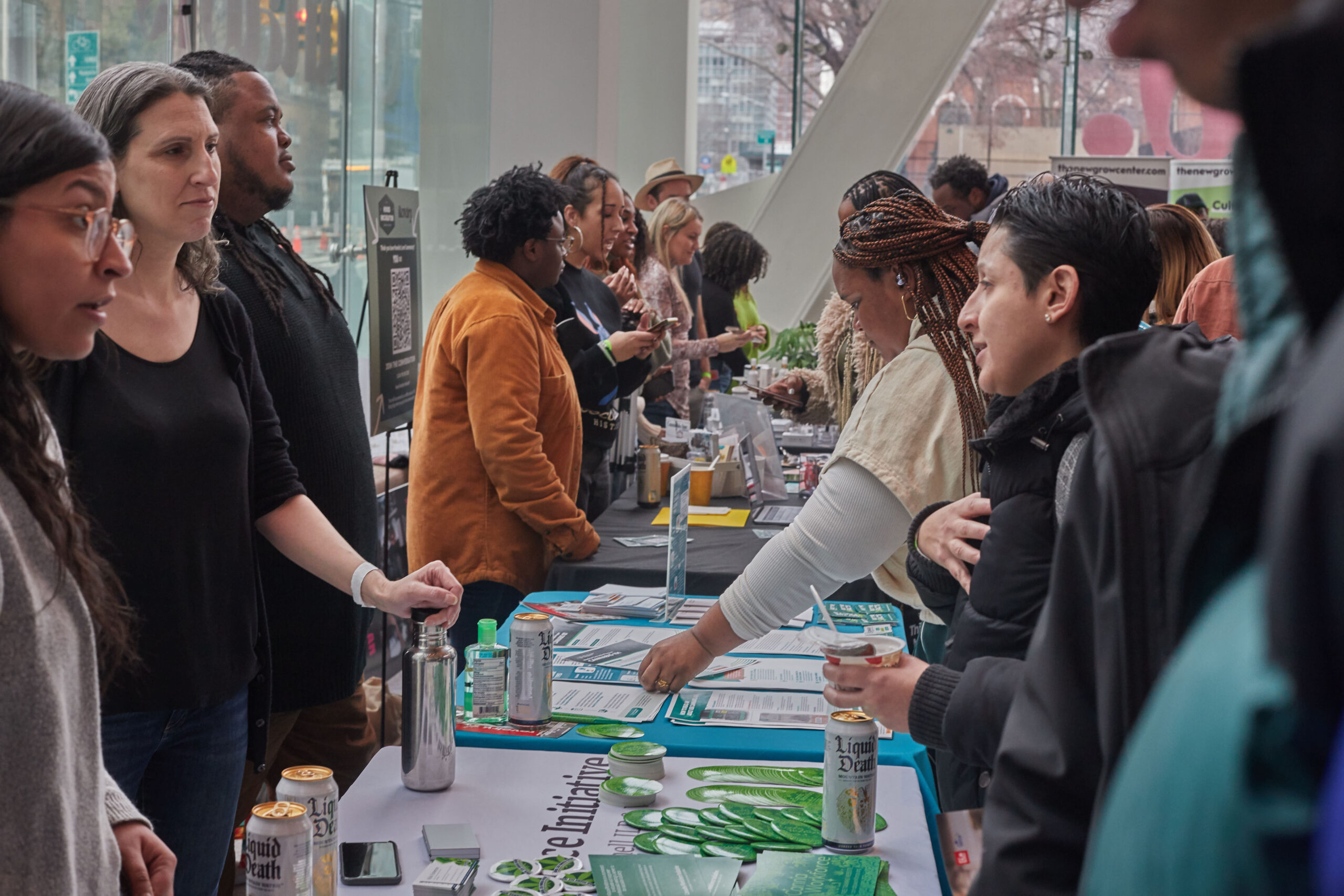Jacobi Holland has been at the forefront of the New York cannabis scene for several years. Launching the event series and brand On The Revel in 2016, Holland and co-founder Lulu Tsui have built the community and inclusivity focused brand into a must-attend event series, including Revelry, a conference series fostering inclusive, collaborative relationships in the space. Today, On The Revel serves as the parent company for a collection of educational and networking events.
In addition to On The Revel, Holland is the founder of Jade Insights, a supply-chain data analytics SaaS platform for the cannabis industry. He is also a partner in Tierra Terpenes, a company that provides wholesale natural and organic terpenes to manufacturers.
In the lead up to Revelry’s fall event in October, Holland spoke with Cannabis & Tech Today about the growth of On The Revel and the emerging cannabis scene.
Cannabis & Tech Today: For those that don’t know, what is Revelry and On The Revel all about?
Jacobi Holland: On the Revel (OTR) is the parent company of a collection of curated networking and educational events designed to democratize information about and access to the cannabis industry to those communities most impacted by the War on Drugs.
Our marquee event, Revelry, has evolved with the New York cannabis market and serves as the central meeting point for business, community, and culture. Fundamentally, we exist to create and amplify the community that we want to see in the cannabis industry.
While many states have failed to embrace the culture and ethos of the legacy cannabis operators, On The Revel believes that legacy culture and industry must coexist to build a sustainable and restorative cannabis industry. Our philosophy is simple: curate a welcoming environment, provide actionable content, and bring together dope people—and let the magic happen!

C&T Today: You’ve grown from a regular community gathering in New York City into throwing full on block parties and multi-day events. How did you make it happen?
JH: Our growth has been both intentional and organic. My co-founder Lulu Tsui and I began our journey as the cannabis tech group, an informal gathering at a coworking space. We invested $500 each to cover pizza, beer, and a modest venue rental. We certainly wanted to focus on the cannabis industry, but did not have a clear vision for what our work would become.
Our speakers and panelists reflected the diversity of the city, and our audience grew in response to seeing folks like themselves who had ventured out to early market states like California and Colorado and were keen to bring that knowledge back home.
The overwhelming feedback was that this was unlike any other cannabis education or networking event, and that we were building something both special and necessary. The reason why? We both operated in traditionally underserved communities and we brought a vibe, energy and ethos that resonated with these populations. From there, we re-imagined our work to create On the Revel, a brand that represents the core philosophy of our business: On the Level–we keep it real about the opportunities and challenges of succeeding in this industry. And Revelry, a celebration because cannabis should be fun.
Our intention is to grow with the New York market. When we started, the collective work was legalization. Hundreds of thousands of New Yorkers, overwhelmingly Black and Brown, were negatively impacted by prohibition. Legalization and restorative social and economic justice was an imperative. Our collection of small business entrepreneurs and legacy operators were an important patch in the much larger legalization advocacy efforts.
Since legalization, our programming has evolved to meet the needs of the burgeoning market. Communities that live with the trauma of over-policing and criminalization during prohibition need a vision of what legal cannabis can look like, so we created the Revelry Cannabis Community Block Party. Newly licensed operators in the supply chain need a place to meet, network, and establish business relationships, so we created the Revelry Buyers’ Club Trade Show.
We are not into expansion for expansion’s sake. We consider ourselves in constant dialogue with our community, and their needs inform our strategy. And in our experience, if they ask us to build it, then they will support it.
C&T Today: You’ve got a strong team at On The Revel and with brand partners, like Weedmaps for example. How critical are they to your success, and how does that relationship work?
JH: As a people-first business, our OTR team and community is the lifeblood of our company. Without them, we are nothing. Everyone on our team has joined organically through attending our events and building relationships with the founders.
When considering our events, first, we go inward and consider the experience and touch points of each of our stakeholder groups, from the canna-curious to the canna-expert. How do we want our sponsors, exhibitors, vendors, venue hosts, community and government partners, and attendees to feel when they experience Revelry?
Our communities are often an afterthought, but we place them at the center of our intention. And we are dogged about high production value and attention to detail because we want folks to know that they deserve the very best.
Partners like the team at Weedmaps trust our vision, intention, and work ethic and understand the value of our rich community, and their support helps bring this vision to life. In this way, our stakeholders are far more than attendees and participants, but, rather, co-creators of a beautiful mosaic of connection that really inspires a feeling of belonging and mutual responsibility.
This ethos exists beyond our events, because people are always looking for answers and connections, and we do our best to help good people however and whenever we can. We’re an odd bunch in the greatest sense of the word, but much more like a family than a business.

C&T Today: On a scale of 1 (the worst) to 10 (the best), how do you rank the current state of legal cannabis in New York City and New York State?
JH: I give it an 8. To be fair, the market is challenging right now. The waters are incredibly rough for a lot of people, and there are many critical issues that need to be addressed like unlicensed retail shops, greater transparency from the Office of Cannabis Management and Cannabis Control Board on licensing, rectifying the impacts of poorly designed and executed deals in the Conditional Adult Use Retail Program.
However, in significant ways, the New York market is booming. A cornerstone of our cannabis policy is the Social and Economic Equity (SEE) program, which aims to ensure that the benefits of legalization are distributed equitably across all communities, with a particular focus on supporting individuals and communities that were disproportionately impacted by the War on Drugs. The SEE program has had a profound impact on the composition of New York’s cannabis industry, with over 80% of the state’s retail dispensaries being SEE-owned. New York already has more minority and criminal punishment system-involved ownership than every other state combined.
The cannabis industry is a hard road for anyone, but the potential for New York to be the heartland of sustainable cannabis small business and the strength, ingenuity, and vigor of our communities indicates that the trajectory is positive.

C&T Today: Flash forward one year from now: What’s cannabis looking like in New York and on the federal level?
JH: New York is going to continue on a trajectory of rapid evolution as the number of licensed operators continues to rapidly increase, particularly the expansion of indoor cultivation, microbusinesses, and existing ROs (vertically integrated medical licensees) into the adult use market. Also, the state and localities have started to take a much more proactive approach to shuttering unlicensed retail operations.
These developments will increase product quality and accessibility to the consumer, which, in turn, should grow the market and spur more investment from outside brands and cannabis companies and encourage local players to double down on their commitment—most of which is healthy and promising for the NY market.
The RO expansion has the potential to create a significant disruptive force in the market as they can likely produce and distribute products with much greater unit economics than the other licensees subject to market tier restrictions. That disruption is likely to be a challenge, but one that we think can be overcome.
But it’s cannabis, so the only certainty is uncertainty. The one outlook for which we are assured, without reservation, is that Revelry 2025 will be the most epic cannabis conference, trade show and festival in the world because we are New York cannabis.

















